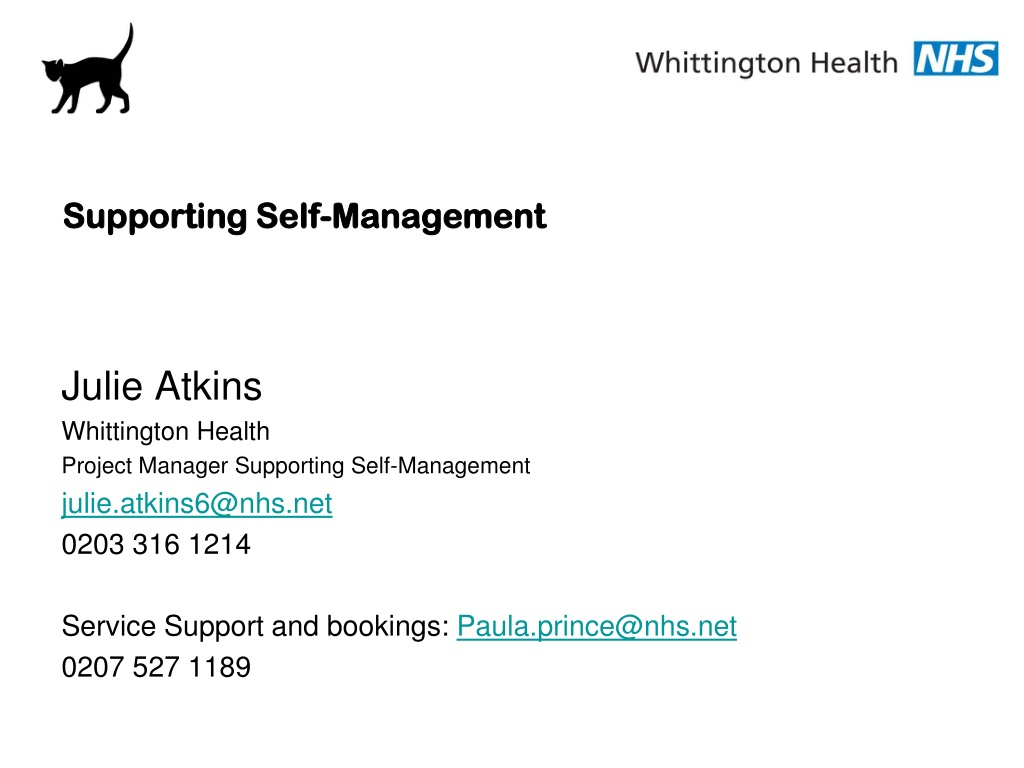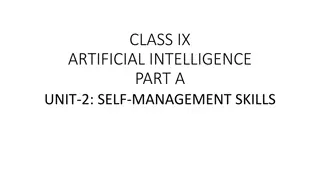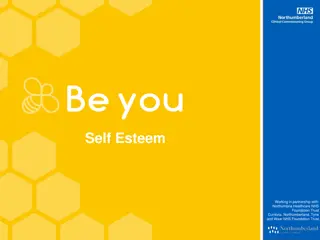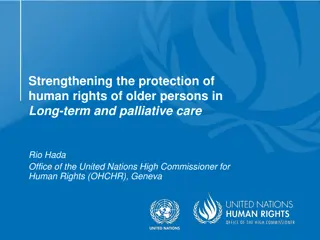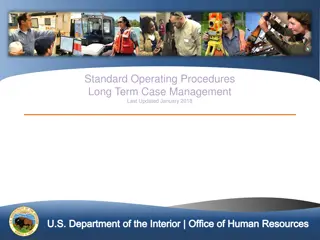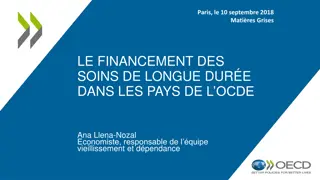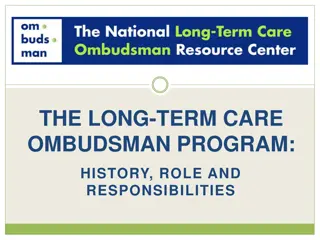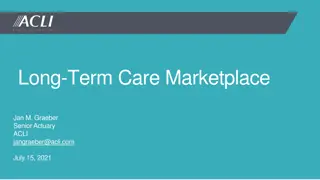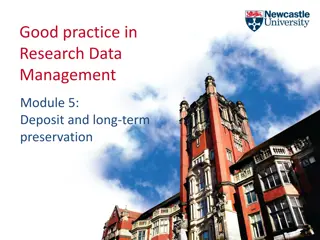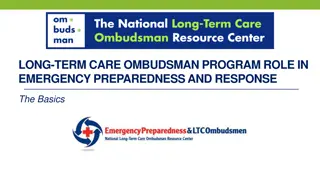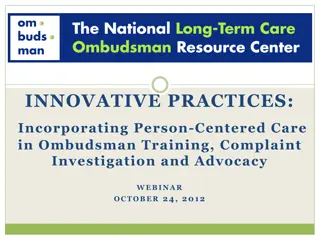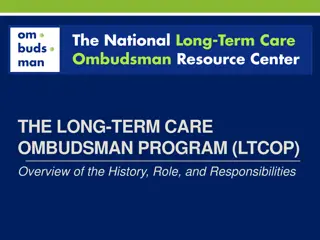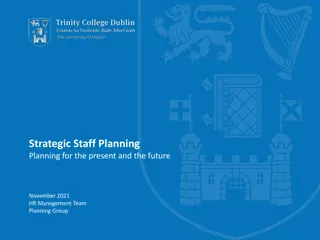Enhancing Self-Management for Long-Term Conditions
Addressing the challenge of long-term conditions in Islington, where 30,000 individuals live with limiting illnesses. Self-management is crucial in dealing with chronic conditions to reduce healthcare costs and improve outcomes. Learn about self-management strategies, the patient's journey, and programs like the Expert Patients Programme and Co-Creating Health Self-Management Programme for Type 2 Diabetes.
Download Presentation

Please find below an Image/Link to download the presentation.
The content on the website is provided AS IS for your information and personal use only. It may not be sold, licensed, or shared on other websites without obtaining consent from the author. Download presentation by click this link. If you encounter any issues during the download, it is possible that the publisher has removed the file from their server.
E N D
Presentation Transcript
Supporting Self Supporting Self- -Management Management Julie Atkins Whittington Health Project Manager Supporting Self-Management julie.atkins6@nhs.net 0203 316 1214 Service Support and bookings: Paula.prince@nhs.net 0207 527 1189
The Challenge of Long The Challenge of Long- -Term Conditions Term Conditions In Islington, 30,000 people live with limiting long-term illness People with chronic conditions are significantly more likely to: See their GP : 80% of consultations Be admitted as inpatients & use more inpatient days: 60% of hospital bed days WHO identified such conditions as the leading cause of disability 2020. If not successfully managed they will become the most expensive problem for health care systems.
What is Self-Management? Dealing with illness & managing symptoms Continuing daily activities Managing emotions Key words: Motivation Self-efficacy i.e. the confidence in one s ability to accomplish a change in a specific behaviour e.g. healthy eating.
Life with a long term condition Self care / management = 8757 in a year Hours with NHS professional = 3 in a year
The Patients Journey to Self-management Importance Confidence Problem-solving Beginning the Journey Low Low Low Finding away Increasing Beginning Low Travelling High High for some Low Staying on track High High High
Co-Creating Health Self-Management Programme (SMP) For people who have Type 2 Diabetes who are not optimally managing (and may have other long-term conditions) 7 weeks (3 hours per week) Clinical and Lay Tutors co-facilitate Based on three enablers agenda setting, goal setting and follow up Local data: statistically significant reductions in HbA1C & LDL cholesterol similar to impact of Sitagliptin
What is the Expert Patients Programme? What is the Expert Patients Programme? 6 week course in self-management skills for people with long-term conditions (2 hrs per week) Deal with the common consequences of LTCs e.g. loss of confidence, stress, pain and fatigue, depression Content similar to Diabetes SMP but generic many have co-morbidities and no clear care pathway e.g. chronic pain; multiple conditions; and those with mild-moderate mental health problems Course tutors are trained lay people experienced in managing their own LTCs More people access EPP from groups with increased levels of LTCs eg Irish, Black Caribbean, Indian and other Asian. Locally run course in Turkish. Quality assured
Which Components Work Best to Support Self Which Components Work Best to Support Self Management Management Involving patients in decision making Emphasising problem solving Developing care plans as a partnership Setting goals and following up achievement Promoting healthy lifestyles Motivation to self manage Helping patients to monitor symptoms Helping patients to manage social, emotional and physical impact of LTC Proactive follow up Opportunities to share/learn from other patients
Skills 5 core self-management skills: a. Problem Solving b. Decision Making c. Resource utilisation d. Formation of a patient professional partnership e. Taking action
Symptom Cycle Disease/ Pain TenseMuscles Fatigue SYMPTOM CYCLE Stress/Anxiety Depression Anger/Frustration/Fear
A Two-Way Process The Empowering Clinician The Empowering Clinician Good listener Clear communicator Works in partnership Monitors condition Good facilitator The Empowered Patient The Empowered Patient Good listener Clear communicator Works in partnership Monitors condition Resource finder Proactive but realistic about the impact of the condition
Evidence 550 pieces of high quality research Total evidence suggests: SMS has benefits on Attitudes Behaviours Quality of Life Clinical Symptoms Use of Healthcare Resources (VALUE)
Impact of EPP Impact of EPP 64% in depression 73% in tiredness 64% in pain 66% had increase in their confidence that they could prevent their condition from interfering with their life Use of care services % GP consultations 7% Outpatient visits 10% A&E attendances 16% Those with less confidence to manage their LTC and coping poorly benefit more from EPP Predicting who will benefit from an EPP self-management course (Reeves, Kennedy et al) BJGP vol 58, Nr 548, March 2008, pp. 198-203
In patients with poor diabetes control, there was a In patients with poor diabetes control, there was a statistically significant reduction in HbA1c statistically significant reduction in HbA1c HbA1c HbA1c - -0.6% 0.6% 13% 13% Deaths related to diabetes 21% Microvascular complications 22% 22% 37% HbA (kidney disease, blindness) 1c 1% 14% 8% 8% Heart attack Amputation or fatal peripheral blood vessel disease 43% 26% 26% Stroke 7% 7% 12% Epidemiological extrapolation showing benefit of a 1% reduction in mean HbA1c Stratton IM et al. UKPDS 35. BMJ 2000; 321: 405 412
Increasing self efficacy Changed behaviour Doing more exercise. Eating more healthy and losing weight . (female 35-44 with endometriosis, MS and back pain) I learnt how to control my illness much more (female, 65-74 with depression and asthma) ..understanding and insight into things I thought were out of my control (female, 45-54 with panic disorder, depression and type 2 diabetes) I take my medication more regularly. Stuck to an exercise regime (male with schizophrenia)
Resources for Patients Islington COPD: Pulmonary Rehabilitation (GP/PN referral via ARTI) The COPE programme (ARTI) NEW!!!!!!! Breathe Easy Groups Self Management Booklets Diabetes: DESMOND (ARTI) (Islington) Conversation Map Intermediate Diabetes Service (Haringey) Co-Creating Health Self Management (Islington) Programme (SMP) Self/GP/PN referral Diabetes UK (Islington) (self) Paula.prince@nhs.net 020 7527 1189
http://www.youtube.com/watch?v=oO47p08nDh4&app=desktop https://www.youtube.com/playlist?list=PLlq77R6WpUIbkjtpsorTgQm BEvKZmyn1n
